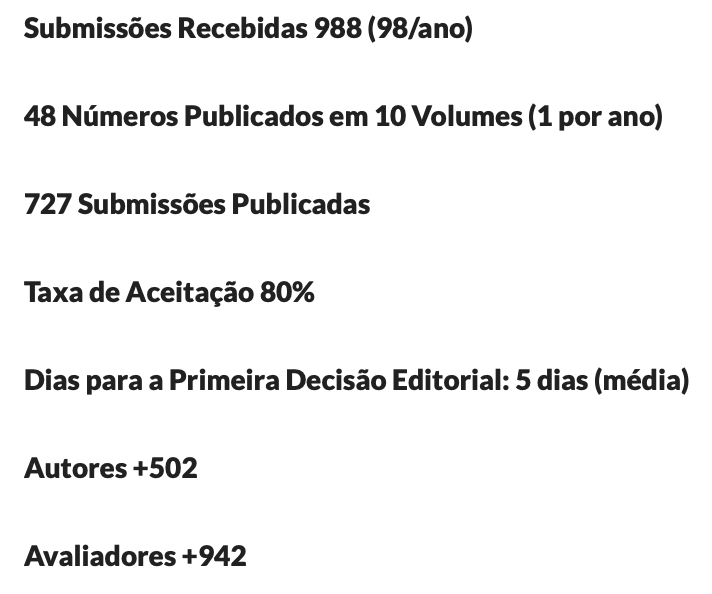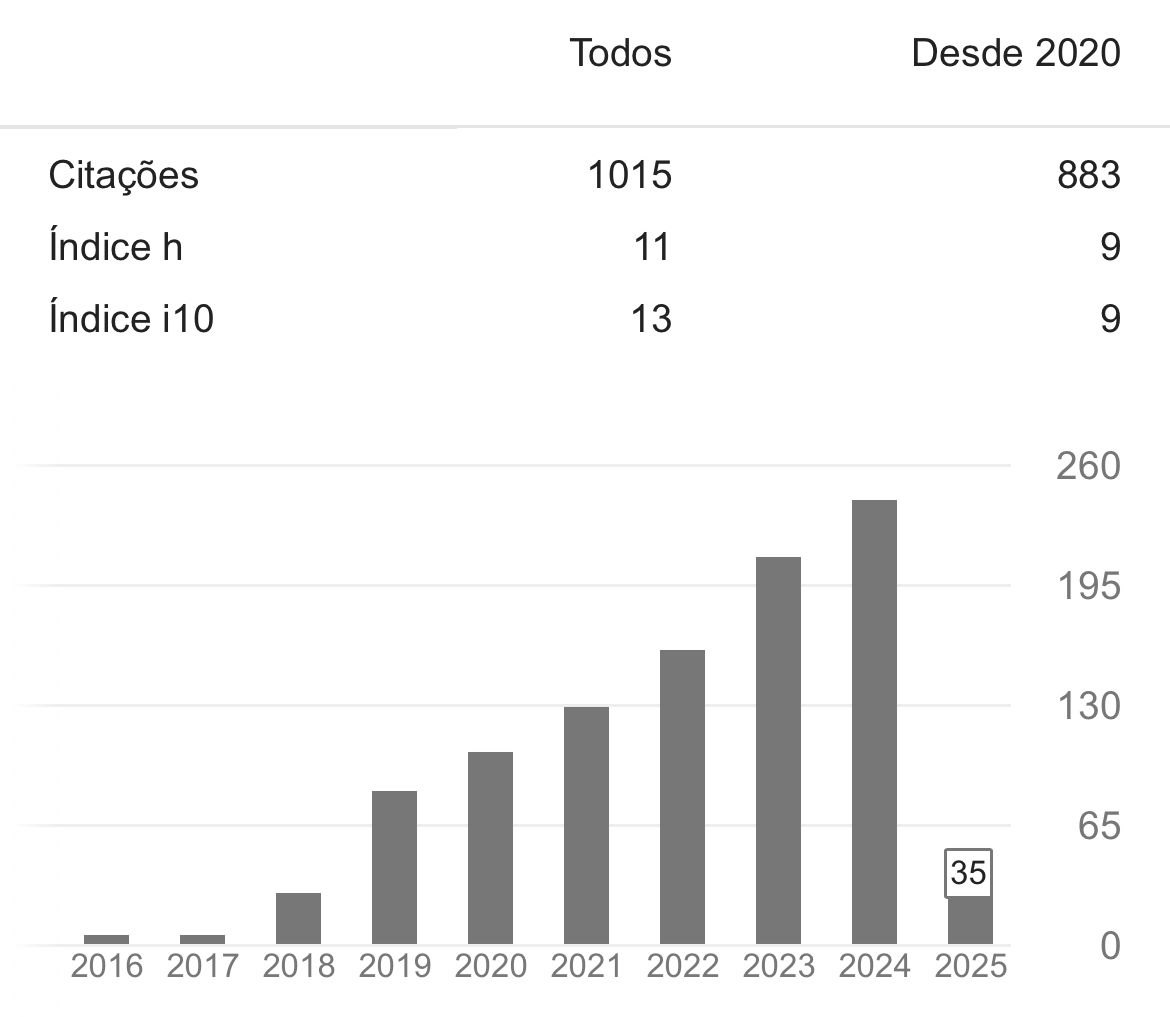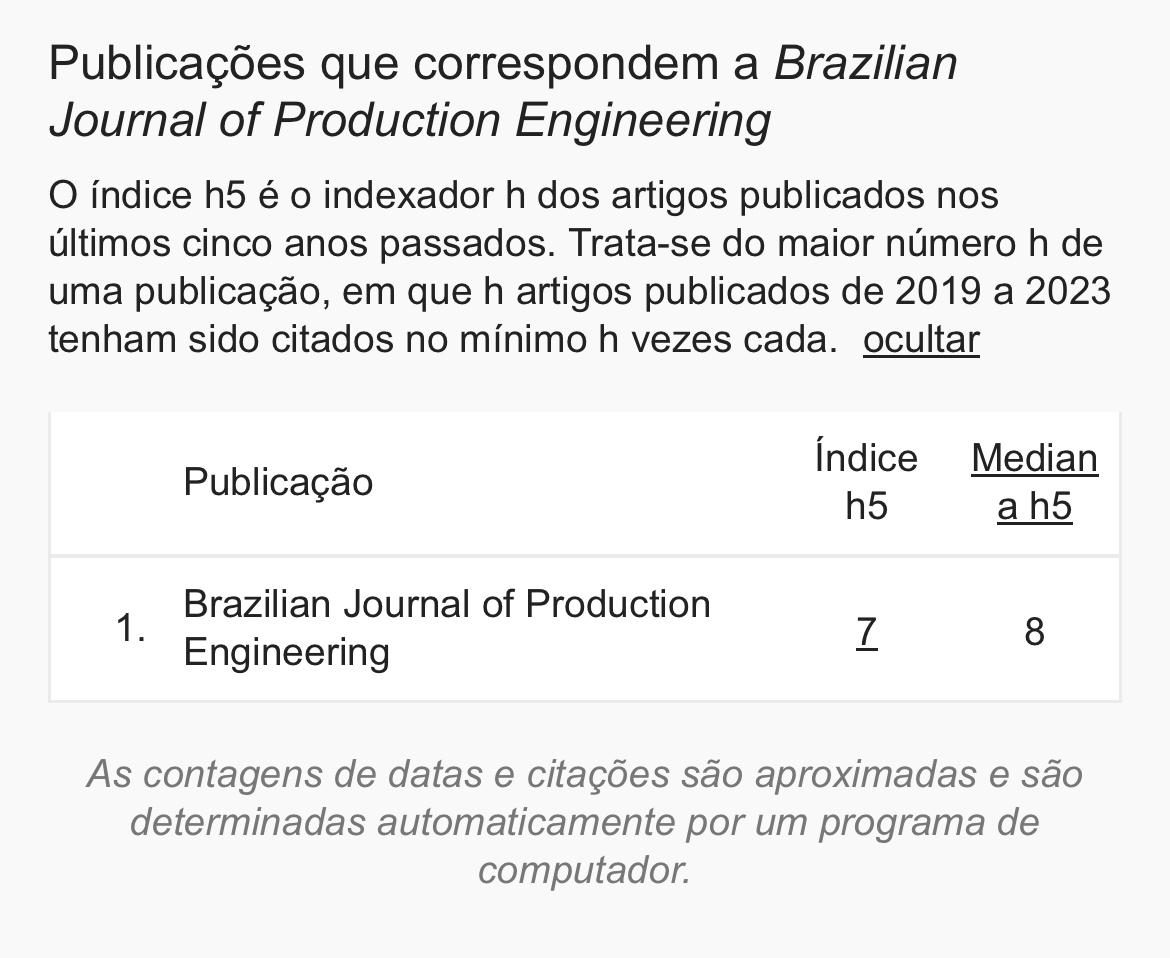Use of active transport to increase the quality of life of the urban population during the covid-19 pandemic in the light of a bibliometric approach
DOI:
https://doi.org/10.47456/bjpe.v7i3.35826Keywords:
COVID-19, Transporte activo, Análisis bibliométricoAbstract
The restrictions implemented by governments to curb the spread of the coronavirus (COVID-19), including social distance, isolation and home confinement, had a major impact on the quality of life of the urban population. Thus, the use of active transportation started to be configured as an important strategy so that the population had access to essential goods, allowing a greater distance between individuals, as well as to improve aspects related to physical and mental health, during the period pandemic. Serving this purpose, this article aims to carry out a bibliographic review with a bibliometric approach to identify how active transportation can positively influence the quality of life of the urban population during the pandemic period. The results indicate that research on the subject, although premature, is growing, and studies have been published in important international journals. In addition, the discussions raised here show that active transportation corresponds to a critical mode that deserves more attention and funding, both during normal periods and in major social disruptions, such as a pandemic such as COVID-19.
Downloads
References
Abreu, V. H. S., & Turini, L. R. (2021). O transporte ativo no combate à disseminação do covid-19. Ciências da Saúde: uma abordagem pluralista. Editora Conhecimento Livre. Piracanjuba-GO. https://doi.org/10.37423/201203424
Alfonsin, N., McLeod, V., Loder, A., & DiPietro, L. (2019). Evaluating a buildings’ impact on active transportation: An interdisciplinary approach. Building and Environment, 106322. https://doi.org/10.1016/j.buildenv.2019.106322
Almeida, I. M., & Abreu, V. H. S. (2021). Desafios para a Promoção do Transporte Ativo: uma Revisão da Literatura. In: XXI Congreso Panamericano de Transporte y Logística - PANAM 2021, Lima, Peru.
Ammar, A., Brach, M., Trabelsi, K., Chtourou, H., Boukhris, O., Masmoudi, L., Bouaziz, B., Bentlage, E., How, D., Ahmed, M., Müller, P., Müller, N., Aloui, A., Hammouda O, Paineiras-Domingos LL, Braakman-Jansen A, Wrede C, Bastoni S, Pernambuco CS, Mataruna L, Taheri M, Irandoust K, Khacharem A, Bragazzi NL, Chamari K, Glenn JM, Bott, NT, Gargouri F, Chaari L, Batatia H, Ali GM, Abdelkarim O, Jarraya M, Abed KE, Souissi N, Van Gemert-Pijnen L, Riemann BL, Riemann L, Moalla W, Gómez-Raja J, Epstein M, Sanderman R, Schulz SV, Jerg A, Al-Horani R, Mansi T, Jmail M, Barbosa F, Ferreira-Santos F, Šimunič B, Pišot R, Gaggioli A, Bailey SJ, Steinacker JM, Driss T, Hoekelmann A. (2020). Effects of COVID-19 Home Confinement on Eating Behaviour and Physical Activity: Results of the ECLB-COVID19 International Online Survey. Nutrients, 28, 12(6), 1583. https://doi.org/10.3390/nu12061583
Arellana, J., Márquez, L., & Cantillo, V. (2020). COVID-19 Outbreak in Colombia: An Analysis of Its Impacts on Transport Systems. Journal of Advanced Transportation, 2020, 1–16. https://doi.org/10.1155/2020/8867316
BBC - British Broadcasting Corporation. (2020). Will Covid-19 make urban cycling more inclusive? Disponível em: https://www.bbc.com/worklife/article/20200724-will-covid-19-make-urban-cycling-more-inclusive
BCHLA - BC Healthy Living Alliance. (2020). Guest post: BC Cycling Coalition’s COVID-19 and Active Transportation. Recuperado de https://www.bchealthyliving.ca/guest-post-bc-cycling-coalitions-covid-19- and-active-transportation/
Beck, M. J., & Hensher, D. A. (2020). Insights into the impact of COVID-19 on household travel and activities in Australia – The early days under restrictions. Transport Policy, 96, 76–93. https://doi.org/10.1016/j.tranpol.2020.07.001
Brady, S. M., Fenton, S. A. M., Metsios, G. S., Bosworth, A., Duda, J. L., Kitas, G. D., & Veldhuijzen van Zanten, J. J. C. S. (2020). Different types of physical activity are positively associated with indicators of mental health and psychological wellbeing in rheumatoid arthritis during COVID-19. Rheumatology International. https://doi.org/10.1007/s00296-020-04751-w
Brooks, J. H. M., Tingay, R., & Varney, J. (2020a). Social distancing and COVID-19: an unprecedented active transport public health opportunity. British Journal of Sports Medicine, bjsports–2020–102856. https://doi.org/10.1136/bjsports-2020-102856
Brooks, S. K., Webster, R. K., Smith, L. E., Woodland, L., Wessely, S., Greenberg, N., & Rubin, G. J. (2020b). The psychological impact of quarantine and how to reduce it: rapid review of the evidence. The Lancet. https://doi.org/10.1016/s0140-6736(20)30460-8
Chan, K., & Farber, S. (2019). Factors underlying the connections between active transportation and public transit at commuter rail in the Greater Toronto and Hamilton Area. Transportation. https://doi.org/10.1007/s11116-019-10006-w
Chen, X. (2010). The declining value of subscription-based abstracting and indexing services in the new knowledge dissemination era. Serials Review, 36(2), 79-85.
Cheval, B., Sivaramakrishnan, H., Maltagliati, S., Fessler, L., Forestier, C., Sarrazin, P., Orsholits, D.; Chalabaev, A.; Sander, D; Ntoumanis, N. & Boisgontier, M. P. (2021). Relationships between changes in self-reported physical activity, sedentary behaviour and health during the coronavirus (COVID-19) pandemic in France and Switzerland. Journal of sports sciences, 39(6), 699-704. https://doi.org/10.1080/02640414.2020.1841396
De Nazelle, A., Nieuwenhuijsen, M. J., Antó, J. M., Brauer, M., Briggs, D., Braun-Fahrlander, C., … Lebret, E. (2011). Improving health through policies that promote active travel: A review of evidence to support integrated health impact assessment. Environment International, 37(4), 766–777. https://doi.org/10.1016/j.envint.2011.02.003
De Vos, J. (2020). The effect of COVID-19 and subsequent social distancing on travel behavior. Transportation Research Interdisciplinary Perspectives, 100121. https://doi.org/10.1016/j.trip.2020.100121
Dutheil, F., Baker, J. S., & Navel, V. (2020). COVID-19 as a factor influencing air pollution? Environmental Pollution, 114466. https://doi.org/10.1016/j.envpol.2020.114466
Giménez-Gaydou, D. A., Cupido dos Santos, A., Mendes, G., Frade, I., & Ribeiro, A. S. N. (2019). Energy consumption and pollutant exposure estimation for cyclist routes in urban areas. Transportation Research Part D: Transport and Environment, 72, 1–16. https://doi.org/10.1016/j.trd.2019.04.005
Hawkley, L. C., & Capitanio, J. P. (2015). Perceived social isolation, evolutionary fitness and health outcomes: a lifespan approach. Philos. Trans. R. Soc. Lond. Ser. B Biol. Sci. 370:20140114. https://doi.org/10.1098/rstb.2014.0114
Hendrickson, C., & Rilett, L. R. (2020). The COVID-19 Pandemic and Transportation Engineering. Journal of Transportation Engineering Part A: Systems, 146(7), 01820001. https://doi.org/10.1061/jtepbs.0000418
Huang, Y., Wu, Q., Wang, P., Xu, Y., Wang, L., Zhao, Y., Yao, D.; Xu, Y.; Ly, O. & Xu, S. (2020). Measures undertaken in China to avoid COVID-19 infection: internet-based, cross-sectional survey study. Journal of medical Internet research, 22, 5, e18718. https://doi.org/10.2196/18718
IEA - International Energy Agency. (2020). Changes in transport behaviour during the Covid-19 crisis. Disponível em: https://www.iea.org/articles/changes-in-transport-behaviour-during-the-covid-19-crisis
Kelly, P., Williamson, C., Baker, G., Davis, A., Broadfield, S., Coles, A., Gill, J. M. (2020). Beyond cycle lanes and large-scale infrastructure: a scoping review of initiatives that groups and organisations can implement to promote cycling for the Cycle Nation Project. British Journal of Sports Medicine, bjsports–2019–101447. https://doi.org/10.1136/bjsports-2019-101447
Kiecolt-Glaser, J. K., McGuire, L., Robles, T. F., and Glaser, R. (2002). Emotions, morbidity, and mortality: new perspectives from psychoneuroimmunology. Annu. Rev. Psychol., 53, 83–107. https://doi.org/10.1146/annurev.psych.53.100901.135217
Laverty, A. A., Millett, C., Majeed, A., & Vamos, E. P. (2020). COVID-19 presents opportunities and threats to transport and health. Journal of the Royal Society of Medicine, 113(7), 251–254. https://doi.org/10.1177/0141076820938997
Maugeri, G., Castrogiovanni, P., Battaglia, G., Pippi, R., D’Agata, V., Palma, A., … Musumeci, G. (2020). The impact of physical activity on psychological health during Covid-19 pandemic in Italy. Heliyon, 6(6), e04315. https://doi.org/10.1016/j.heliyon.2020.e04315
Moslem, S., Campisi, T., Szmelter-Jarosz, A., Duleba, S., Nahiduzzaman, K. M., & Tesoriere, G. (2020). Best–Worst Method for Modelling Mobility Choice after COVID-19: Evidence from Italy. Sustainability, 12(17), 6824. https://doi.org/10.3390/su12176824
Muhammad, S., Long, X., & Salman, M. (2020). COVID-19 pandemic and environmental pollution: A blessing in disguise? Science of The Total Environment, 138820. https://doi.org/10.1016/j.scitotenv.2020.138820
NCMM - National Center for Mobility Management. (2020). Active Transportation in the Era of COVID-19. Disponível em: https://nationalcenterformobilitymanagement.org/active-transportation-during-covid-19/
Neto, T. O., Garcia, T. D. S. L., & Spinussi, E. (2020). Pandemia de COVID-19, as fronteiras pelo mundo e o transporte aéreo na Itália. Confins. Revue franco-brésilienne de géographie/Revista franco-brasilera de geografia, 44. https://doi.org/10.4000/confins.27577
Nurse, A., & Dunning, R. (2020). Is COVID-19 a turning point for active travel in cities? Cities & Health, 1–3. https://doi.org/10.1080/23748834.2020.1788769
Rissel, C., Crane, M., Wen, L. M., Greaves, S., & Standen, C. (2015). Satisfaction with transport and enjoyment of the commute by commuting mode in inner Sydney. Heal. Promot. J. Aust., 27, 80–83. https://doi.org/10.1071/HE15044
Rodrigues, P. F., Alvim-Ferraz, M. C. M., Martins, F. G., Saldiva, P., Sá, T. H., & Sousa, S. I. V. (2019). Health economic assessment of a shift to active transport. Environmental Pollution, 113745. https://doi.org/10.1016/j.envpol.2019.113745
Rojas-Rueda, D., de Nazelle, A., Andersen, Z. J., Braun-Fahrländer, C., Bruha, J., Bruhova-Foltynova, H., … Nieuwenhuijsen, M. J. (2016). Health Impacts of Active Transportation in Europe. PLOS ONE, 11(3), e0149990. https://doi.org/10.1371/journal.pone.0149990
Safe Routes Partnership. (2020). Advocating for Active Transportation in the Time of Covid-19. Recuperado de https://www.saferoutespartnership.org/blog/advocating-active-transportation-time-covid-19
Sallis, J. F., Frank, L. D., Saelens, B. E., & Kraft, M. K. (2004). Active transportation and physical activity: opportunities for collaboration on transportation and public health research. Transportation Research Part A: Policy and Practice, 38(4), 249–268. https://doi.org/10.1016/j.tra.2003.11.003
Santos, A. S., de Abreu, V. H. S., de Assis, T. F., Ribeiro, S. K., & Ribeiro, G. M. (2021). An Overview on Costs of Shifting to Sustainable Road Transport: A Challenge for Cities Worldwide. Carbon Footprint Case Studies, 93-121. https://doi.org/10.1007/978-981-15-9577-6_4
Siedner, M. J., Harling, G., Reynolds, Z., Gilbert, R. F., Haneuse, S., Venkataramani, A. S., & Tsai, A. C. (2020). Social distancing to slow the US COVID-19 epidemic: Longitudinal pretest–posttest comparison group study. PLOS Medicine, 17(8), e1003244. https://doi.org/10.1371/journal.pmed.1003244
Slimani, M., Paravlic, A., Mbarek, F., Bragazzi, N. L., & Tod, D. (2020). The Relationship Between Physical Activity and Quality of Life During the Confinement Induced by COVID-19 Outbreak: A Pilot Study in Tunisia. Frontiers in Psychology, 11. https://doi.org/10.3389/fpsyg.2020.01882
Souza, G. M.; Abreu, V. H. S. (2021). Transporte Ativo no Combate à Disseminação do COVID-19: Uma Abordagem Bibliométrica. In: XXI Congreso Panamericano de Transporte y Logística - PANAM 2021, Lima, Peru.
Tian H, et al. (2020). Early evaluation of Wuhan city travel restrictions in response to the 2019 novel coronavirus outbreak. Medrxiv. https://doi.org/10.1126/science.abb6105
Tosepu, R., Gunawan, J., Effendy, S.D., Ahmad, A.I., Lestari, H., Bahar, H., Asfian, P., (2020). Correlation between weather and Covid-19 pandemic in Jakarta, Indonesia. Sci. Total Environ. https://doi.org/10.1016/j.scitotenv.2020.138436
Ugolini, F., Massetti, L., Calaza-Martínez, P., Cariñanos, P., Dobbs, C., Ostoic, S. K., … Sanesi, G. (2020). Effects of the COVID-19 pandemic on the use and perceptions of urban green space: an international exploratory study. Urban Forestry & Urban Greening, 126888. https://doi.org/10.1016/j.ufug.2020.126888
Wannmacher, L. (2016). Obesidade como fator de risco para morbidade e mortalidade: evidências sobre o manejo com medidas não medicamentosas. Recuperado de https://www.paho.org/bra/index.php?option=com_docman&view=download&category_slug=serie-uso- racional-medicamentos-284&alias=1535-obesidade-como-fator-risco-para-morbidade-e-mortalidade-evidencias-sobre-o-manejo-com-medidas-nao-medicamentosas5&Itemid=965
Wong, A. Y.-Y., Ling, S. K.-K., Louie, L. H.-T., Law, G. Y.-K., So, R. C.-H., Lee, D. C.-W., Chung-Fai, Y.; Yung, P. S.-H. (2020). Impact of the COVID-19 pandemic on sports and exercise. Asia-Pacific Journal of Sports Medicine, Arthroscopy, Rehabilitation and Technology, 22, 39–44. https://doi.org/10.1016/j.asmart.2020.07.006
WRI Brasil. (2020). Bicicletas têm papel crucial na resiliência das cidades durante crise da Covid-19. Recuperado de https://wribrasil.org.br/pt/blog/2020/04/bicicletas-tem-papel-crucial-na-resiliencia-das-cidades- durante-crise-da-covid-19
Zhang, J., Hayashi, Y., & Frank, L. D. (2021). COVID-19 and transport: Findings from a world-wide expert survey. Transport Policy, 103, 68-85. https://doi.org/10.1016/j.tranpol.2021.01.011
Downloads
Published
How to Cite
Issue
Section
License
Copyright (c) 2021 Brazilian Journal of Production Engineering - BJPE

This work is licensed under a Creative Commons Attribution-NonCommercial-ShareAlike 4.0 International License.

















































































